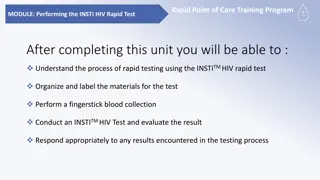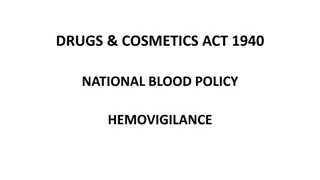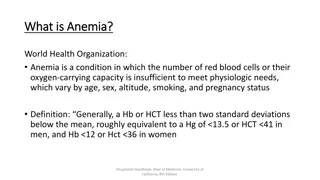
Ferritin Blood Test Its Purpose, Levels, and Treatments
Ferritin is a protein that stores iron in your body and plays a crucial role in maintaining adequate iron levels. Abnormal ferritin levels can indicate issues such as iron deficiency or iron overload. If you're experiencing symptoms of abnormal ferri
- Ferritin Test
- Ferritin Levels
- Iron Deficiency
- Blood Test
- Health Check
- Iron Health
- Ferritin Results
- Lab Tests
- Health Monitoring
- GP
- Doctors
- Pathology
- Blood Tests
Download Presentation

Please find below an Image/Link to download the presentation.
The content on the website is provided AS IS for your information and personal use only. It may not be sold, licensed, or shared on other websites without obtaining consent from the author. Download presentation by click this link. If you encounter any issues during the download, it is possible that the publisher has removed the file from their server.
E N D
Presentation Transcript
+ WHAT IS A FERRITIN BLOOD TEST?
WHAT IS A FERRITIN BLOOD TEST? + A Ferritin Blood Test is a diagnostic tool used to measure the ferritin level in your blood. Ferritin is a protein that stores and releases iron in your body, making this test crucial for evaluating your iron levels and overall iron storage.
PURPOSE OF THE FERRITIN BLOOD TEST Diagnosing Iron Deficiency One of the primary purposes of the Ferritin Blood Test is to diagnose iron deficiency, which can lead to anemia. Low ferritin levels often indicate that your body s iron stores are depleted, and you may need dietary adjustments or supplements to restore healthy iron levels. +
Evaluating Iron Overload Conversely, the test can also help diagnose conditions associated with iron overload, such as hemochromatosis. Elevated ferritin levels may indicate excessive iron accumulation in the body, which can be harmful and may require medical intervention. Monitoring Chronic Diseases The Ferritin Blood Test is useful in monitoring chronic diseases that affect iron levels, such as chronic kidney disease or inflammatory conditions. By tracking ferritin levels, healthcare providers can better manage these conditions and adjust treatments as needed. +
LEVELS OF FERRITIN BLOOD TEST +
Normal Ferritin Levels For most adults, normal ferritin levels typically fall within: Men: 20 to 500 nanograms per milliliter (ng/mL) Women: 20 to 200 ng/mL These ranges can vary slightly depending on the laboratory and the individual's health status. Normal ferritin levels suggest that iron stores in the body are adequate and functioning properly. +
For children, normal ferritin levels can differ based on age: Infants (0-6 months): 100 to 600 ng/mL Children (1-5 years): 7 to 140 ng/mL Children (6-15 years): 10 to 200 ng/mL Normal ferritin levels in children indicate sufficient iron stores necessary for growth and development. +
Low Ferritin Levels Low ferritin levels often signify iron deficiency, which can lead to anemia. Causes of low ferritin may include: Inadequate Iron Intake: Diet lacking iron-rich foods. Chronic Blood Loss: Conditions such as heavy menstrual periods or gastrointestinal bleeding. Malabsorption Issues: Conditions like celiac disease that affect iron absorption. Symptoms of iron deficiency may include fatigue, weakness, pale skin, and shortness of breath. +
Low ferritin can also be associated with: Chronic Inflammatory Conditions: Diseases like rheumatoid arthritis or Crohn's disease can affect iron storage. Kidney Disease: Impaired kidney function can impact iron levels. +
High Ferritin Levels Elevated ferritin levels might indicate an excess of iron in the body, a condition known as hemochromatosis. This can result from: Genetic Disorders: Hereditary hemochromatosis causes excessive iron absorption. Frequent Blood Transfusions: Repeated transfusions can lead to iron buildup. + Symptoms of iron overload include joint pain, abdominal pain, and fatigue.
High ferritin levels may also be associated with: Chronic Infections: Conditions like tuberculosis or hepatitis. Cancer: Certain cancers can cause elevated ferritin levels as part of the body s response to illness. +
TREATMENT FOR FERRITIN BLOOD TEST +
Iron Deficiency If a ferritin blood test shows low levels, it often indicates iron deficiency. Treatments for iron deficiency include: Iron Supplements: Oral iron supplements are the most common treatment. These are available over- the-counter or by prescription and help replenish iron levels. Dietary Changes: Incorporating iron-rich foods into your diet, such as red meat, poultry, fish, legumes, and leafy greens, can improve iron levels. Vitamin C can also enhance iron absorption. + Intravenous Iron Therapy: For severe cases of iron deficiency or if oral supplements are ineffective, intravenous (IV) iron therapy may be used. This involves administering iron directly into the bloodstream.
Iron Overload High ferritin levels can indicate iron overload or conditions like hemochromatosis. Treatments for iron overload include: Phlebotomy: This procedure involves regularly removing a small amount of blood to reduce excess iron levels. It is similar to donating blood and helps to gradually lower iron levels in the body. Chelation Therapy: In cases where phlebotomy is not suitable, chelation therapy may be used. This involves administering medications that bind to excess iron, which is then excreted from the body. + Dietary Adjustments: Reducing the intake of iron-rich foods and avoiding vitamin C supplements (which can increase iron absorption) can help manage iron overload.
Underlying Health Conditions Abnormal ferritin levels might also be a sign of underlying health conditions such as chronic inflammation, liver disease, or certain cancers. Treating these conditions involves: Medication: Depending on the underlying condition, medications may be prescribed to manage symptoms or address the root cause. Lifestyle Modifications: Adopting a healthier lifestyle, including a balanced diet and regular exercise, + can support overall health and may help improve ferritin levels.
Regular Monitoring by Professional Check your ferritin levels regularly to make sure the treatment is working and to adjust if needed. If you re in Australia, you might want to see a GP in Liverpool for the best care. Follow-up tests will help track your progress and make sure your ferritin levels stay normal.
THANK YOU THANK YOU
















































